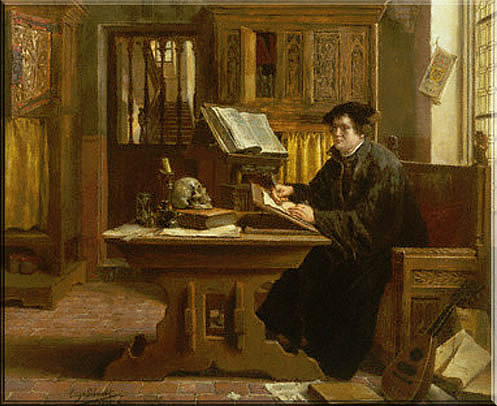We live in an era when fame is highly desired. Whether it’s getting hits on social media, getting invited to desirable gatherings, or making it big in Hollywood or Nashville, people want to be known, to be memorable— often for the wrong reasons. It’s noteworthy, then, that in 2017 the Lutheran church—and the world—marks a big anniversary involving one of our own (our founder, actually). Martin Luther didn’t intend to become famous, and yet he changed the world, helping to usher in the modern era.
This article doesn’t have room to detail Luther’s life and accomplishments, and you will probably be hearing a lot about them from many sources, so this will just provide a brief overview.
Martin Luther was born in 1483 in what is now central Germany but then was a separate principality called Saxony. His parents tried to give him a good education and hoped he would become a lawyer. Instead, when he was twenty-one he became a Catholic monk. He wanted to earn God’s love but was tormented by the sense that he could never be good enough. He punished himself mercilessly until finally a wise mentor sent him to study and teach Bible at the then new University of Wittenberg.
Not long after he arrived there, he became incensed by the church saying, in effect, that if people bought a certain document—an indulgence—it would provide God’s forgiveness for their (or a loved one’s) sins. Being a university professor, he wrote a list of ninety-five sentences to debate about the topic. That list, the Ninety-Five Theses, stirred up a hornet’s nest in the church and began the Reformation. He made them public on October 31, 1517—coming up on five hundred years ago.
For challenging the church and refusing to back down, Luther was called before the Holy Roman emperor, Charles V, at a meeting in the imperial city of Worms. Asked to take back what he had written, he refused and was declared an outlaw. Anyone could have captured him and killed him or turned him in to authorities, in which case his death was likely. Fortunately, his own prince protected him, hiding him out in a castle where he began translating the Bible into German. In the process, he helped create the standard German language.
Luther wrote many influential books, most of which are still valued today. He created the Small Catechism to guide ordinary people in learning about God. He wrote hymns such as “A mighty fortress is our God.” He was a passionate, sometimes crudely mannered man, and in later life he wrote terrible, cruel things about the Jewish people, statements for which the Lutheran church has apologized.
Yet Luther was a remarkable man, helping to create the modern notion of what it means to be an individual, not just an atom in a sea of molecules, and, of course, reviving and reforming the church. He is a man worth celebrating!
This is one in a series of articles about Lutheranism on the 500th Anniversary of the Reformation. © 2016 Augsburg Fortress. Used by permission.


